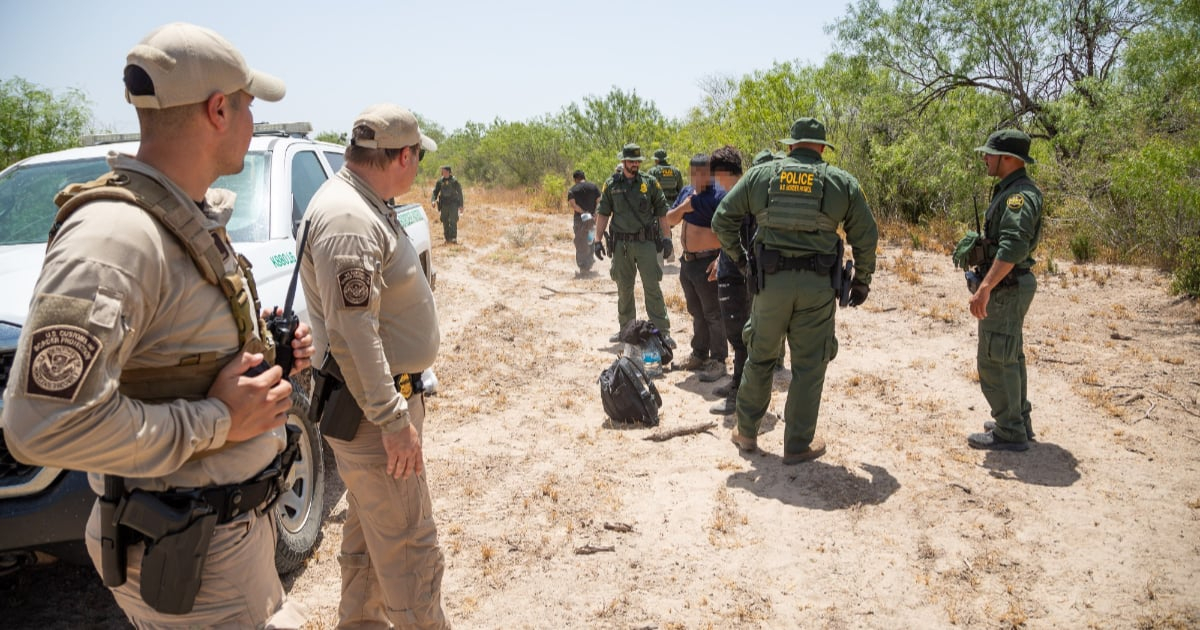
The executive order signed on Tuesday by the President of the United States, Joe Biden, implies several changes in the operation of the border that affect Cuban migrants.
The measure drastically restricts asylum requests at the border with Mexico and will allow U.S. authorities to deport those who do not meet strict asylum standards. In the case of Cubans who do not arrive with a CBP One appointment, they will be immediately returned to Mexico.
In addition, it will allow the closure of the border when the number of daily detentions exceeds 2,500 over an average of seven days.
What changes with this new Biden order?
The first action is to prohibit immigrants who cross the southern border illegally from receiving asylum, unless they arrive with an appointment from CBP One (which offers 1,450 appointments per day), in which case the option for asylum will be available.
This proclamation under sections 212(f) and 215(a) of the Immigration and Nationality Act suspends the entry of non-citizens who illegally cross the border and is accompanied by a final interim rule from the Departments of Justice and Homeland Security, which restricts asylum for those non-citizens.
The standard will be in effect when the southern border is overwhelmed and will enable immigration officials to quickly deport individuals who have no legal basis to remain in the United States.
2- The border will be closed immediately when the number of encounters exceeds 2,500 per day, so this measure could take effect immediately because the daily figures currently exceed that number.
3- The protocols for requesting asylum will be relaxed once that number decreases to an average of 1,500 for 14 days, which could be difficult to achieve since the last time the average of detentions dropped to 1,500 was in July 2020, during the peak of the pandemic.
4- On their part, migrants who arrive and can apply for asylum must demonstrate that there is a "reasonable possibility" that they are at risk of experiencing torture or being persecuted if they are returned to their country of origin. This will adhere to the obligations of the United Nations Convention against Torture, which prohibits sending someone to a country where they may face torture.
5- If migrants cannot demonstrate that they qualify for asylum under this higher standard, they will undergo a deportation process within hours or days.
In that case, the situation will vary depending on the nationality of the migrant or asylum seeker: Mexicans or nationals of Cuba, Haiti, Nicaragua, and Venezuela will be returned directly to Mexico under previous agreements between the U.S. and Mexican authorities.
Those who arrive at the border from other parts, such as Colombia or Ecuador, or other countries outside of Latin America, will be deported on deportation flights.
The standard includes exceptions for unaccompanied minors traveling north, as well as victims of human trafficking, those with an acute medical emergency, or an extreme threat to their life and safety.
7- The measures are not permanent. The protocols for requesting asylum will relax again once that number decreases to 1,500 encounters on average for 14 days. However, this could be difficult to achieve since the last time the average number of detentions dropped to 1,500 was in July 2020, in the midst of the pandemic.
Other recent actions to secure the border in the U.S.
1. In the context of these measures, the Department of Homeland Security also issued a rule to ensure that migrants who pose a risk to public or national security are expelled as quickly as possible in the process, rather than remaining in prolonged and costly detention before their expulsion.
2. Actions to resolve immigration cases more quickly: The Department of Justice and the Department of Homeland Security launched a recent arrivals docket to expedite the resolution of cases of migrants attempting to cross between entry ports along the southern border in violation of the law.
The Department of Justice will be able to quickly address these cases, and the Department of Homeland Security will be able to expel individuals who do not have a legal basis to remain in the United States sooner, while granting protection to those with valid claims.
3. Visas revoked for CEOs and government officials who benefit from immigrants arriving illegally in the US: The Department of State imposed visa restrictions on executives of several Colombian transportation companies that profit from the trafficking of migrants via maritime routes. This action takes strong measures against companies that assist in facilitating illegal entry into the United States.
The Department of State also imposed visa restrictions on more than 250 members of the Nicaraguan government, non-governmental actors, and their immediate family members, for their role in supporting the Ortega-Murillo regime, which is selling transit visas to migrants within and outside the West.
The Department of State revoked visas of charter airline executives for similar actions.
4. Expanded efforts to dismantle human trafficking and support immigration processes.
The State and Justice Departments launched an initiative called "Rewards against smuggling," designed to dismantle the leadership of human trafficking organizations that bring migrants through Central America and the southern border of the United States.
The initiative will offer financial rewards for information leading to the identification, location, arrest, or conviction of the main perpetrators of significant human trafficking activities in the region.
The Department of Justice will seek new and increased sanctions against human traffickers in order to properly address the seriousness of their criminal behavior and the human misery it causes.
This department will partner with the Department of Homeland Security to assign additional prosecutors and support staff to increase immigration-related prosecutions in critical federal border prosecutions.
Despite these measures, Biden assured that he will not "demonize" migrants, and asked Americans for patience and trust in his management of the immigration issue as the November elections approach.
"I am not going to separate the children from their families," the president promised.
What do you think?
COMMENTFiled under: